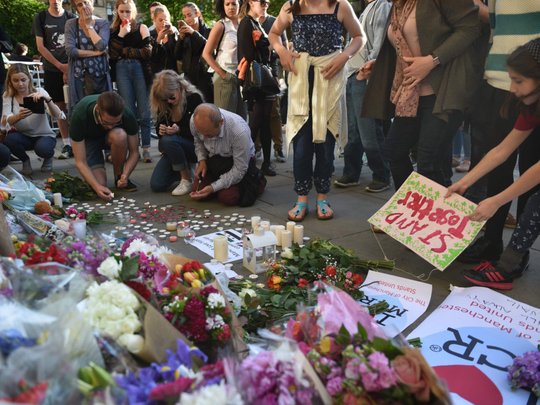
There is no correct reaction to terrorism. The cruelty, fanaticism and madness of a man who explodes a powerful bomb in a crowd of young girls inspires all kinds of feelings: Horror, anger, sadness, fear, revulsion. None of those emotions is more “right” than any of the others. None of the language that people use to express them can usefully be judged. Some people cried after news of the attack in Manchester, England. Others swore and cursed. Both responses are understandable.
But if those powerful emotions are politicised, or if they are used to fuel popular hysteria that will make the situation worse and not better, then they cease to be neutral or natural. The Manchester bombing was an act of extreme evil, and so it has inspired a number of British writers, politicians and celebrities to call for an extreme response. One journalist demanded “internment of thousands of terror suspects now to protect our children”. An ex-politician called for the government to bring back the death penalty.
Even before the biography of the killer was known or his links to outside groups confirmed, a singer attacked the officials who were supposedly too politically correct to call him an Islamic extremist: “In modern Britain, everyone seems petrified to officially say what we all say in private. Politicians tell us they are unafraid, but they are never the victims. How easy to be unafraid when one is protected from the line of fire. The people have no such protections.”
Each one of those statements is both emotionally charged and practically pointless. The death penalty? Hard to see why it would deter a suicide bomber who wanted to die anyway. The “internment of thousands of terror suspects”? Britain tried to fight the Irish Republican Army (IRA) that way, ordering a mass arrest of nearly 350 “terror suspects” in 1971. The result was catastrophic: Real damage was done to the credibility of the British state and the legal system in Northern Ireland, since many of those interned didn’t have IRA links. The mass arrest radicalised more people and led to a sharp increase in violence.
As for charges of political correctness, most British politicians try not to name killers or causes until they are known, which seems like a good rule. And when they are known, they are named. Theresa May, then the British home secretary and now the Prime Minister, delivered a speech in 2015 denouncing the “hatred, bigotry and ignorance” of extremism.
Nor is it remotely true that British politicians are “never the victims”. On the contrary, they are often targets. During the referendum campaign last year, a white supremacist murdered Jo Cox, a British MP. She was hardly “protected from the line of fire”. The politicians who were victims of IRA violence in years past weren’t either.
Far from solving any problems, the purveyors of dramatic solutions or divisive slogans (“the people have no such protections”) don’t help the victims, don’t help their families, don’t help their communities. They don’t prevent future attacks either. They do increase hysteria, amplify anger and exacerbate social division. Which is what terrorists want to achieve, especially the terrorists inspired by anti-western Islamic radicalism, an ideology that wants to bring down democracy, undermine the rule of law and cause a political crisis. The terrorists want to foster antagonism and partisanship. They want to inspire more violence. That’s why they set off bombs.
In truth, the drama queens serve no one but themselves. Maybe they feel brave, offering radical solutions that others “don’t dare” to suggest. Maybe they feel superior when sneering at those who want to defy terrorism by carrying on, by refusing to let violence shatter their working day or their political system.
Look back through history, and it’s clear that the only solutions to terrorism are less dramatic, less immediate, more long-term. They involve things such as better policing and more international cooperation, as well as the forthright teaching of British values in British schools. They require community solidarity, things like the mass vigil that took place in Manchester on Tuesday night, or the offers of tea, blankets and bedrooms extended to people stranded by the attack.
These are policies and actions that work: They keep communities united, increase solidarity, discourage future bombers. But they won’t satisfy the egos of people who need to prove to the world that their emotions are stronger than yours.
— Washington Post
Anne Applebaum is the director of the Global Transitions Programme at the Legatum Institute in London.










